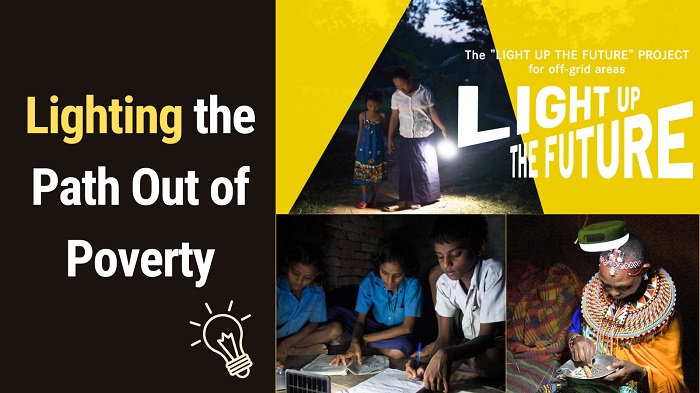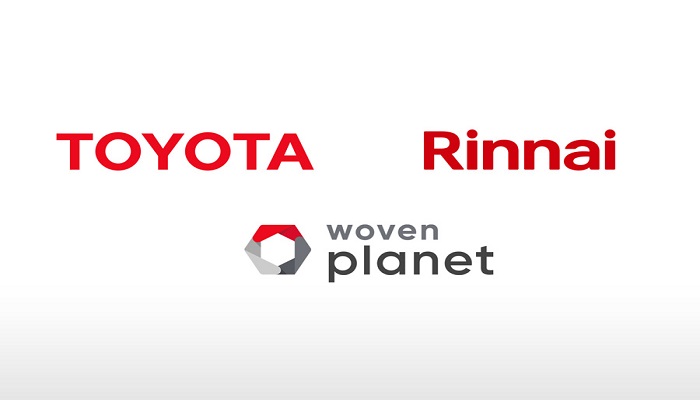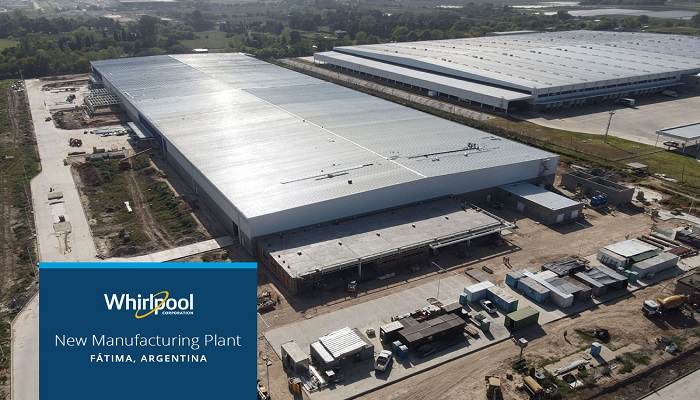An estimated 4 billion people worldwide are surviving on less than $3,000 a year. But poverty is more than a lack of purchasing power—it is a multidimensional issue that also includes lack of access to education and basic infrastructure services, such as electricity. In an era of plentiful electricity, it can be difficult to grasp that approximately 660 million people in Asia, Africa and elsewhere are living in “off-grid areas”—or that in Africa most rural areas have an electrification rate of less than 33%.
Konosuke Matsushita, the founder of Panasonic and inventor of the two-way socket that brought electricity to Japanese society, had a vision of a world free from poverty. Inspired by our founder, Panasonic in 2013 initiated a program to address poverty in off-grid areas. The LIGHT UP THE FUTURE Project utilizes our renewable energy technology to provide lighting/electricity to communities, creating opportunities for education, health, and increased income generation to help realize a society without poverty.
Corporate Citizenship Efforts Shine Light on Poverty and Environment Challenges
For more than 50 years, Panasonic has been conducting Panasonic Group Corporate Citizenship Activities to realize a “sustainable and inclusive society” where everyone can Live Their Best.
On the occasion of its 100th anniversary in 2018, Panasonic revisited its activities and decided that the priority theme would be “Ending Poverty” because it aligns with Konosuke Matsushita’s belief that “eliminating poverty from the world” should be the main mission for the company. Following a review of the group’s basic management policy with an eye on contemporary global social issues, and the introduction of Panasonic’s new environmental concept for the sustainable future, Panasonic GREEN IMPACT (PGI), the company decided that from 2022 onward it would strengthen its focus on another priority theme: “Environmental Activities”. Given Panasonic’s firm belief that nurturing people is the first step toward resolving problems in these two key areas, the company determined that “Human Development (Learning Support)” should be the third priority.
The LIGHT UP THE FUTURE project uniquely combines the first two key themes. Under this project, Panasonic works together with local and international NGOs to alleviate the effects of poverty by utilizing its carbon-free renewable energy technology (solar lanterns, Eneloop solar storage, and photovoltaic and energy storage systems) in combination with on-site support programs.
The project is not a one-off donation, but rather a program designed to leverage the introduction of electricity into off-grid communities as a means for addressing the challenges inherent in multidimensional poverty and promoting longer-term structural change through opportunities for education, health, and increased income generation.
LIGHT UP THE FUTURE Generates Sustainable Outcomes
Beginning in 2013, Panasonic has carried out variety of initiatives to promote electrification in off-grid areas. From 2013 to 2018, Panasonic donated more than 100,000 lanterns to 30 countries in Asia, Africa, and Latin America under the “100 Thousand Solar lanterns Project”.
Building on this initiative, Panasonic launched the “LIGHT UP THE FUTURE” project with an even greater goal: to utilize our renewable energy technology to bring light to areas that have no electricity. Positive outcomes resulting from the project include reducing reliance on dangerous light sources such as kerosene lamps (health and fire risk), facilitating medical treatment at night (including live births and emergency procedures), providing opportunities for night classes and studying, extending viable working hours, and promoting community cohesiveness through social gatherings.
Building on its initial success, Panasonic also initiated another program, called Off-Grid Solution Project, in 2018 for villages in Indonesia, Myanmar, and Kenya. To achieve the intended social impact of sustainable growth in communities, Panasonic designed an activity process for each area that yielded a variety of results after three years of implementation. One of the latest LIGHT UP THE FUTURE projects, being implemented in collaboration with UNFPA, got under way in Kenya in October 2022.
Eliminating Poverty in Off-Grid Areas in Kenya – Two Projects
Enkutoto District, Narok County/World Vision
In 2018, Panasonic launched a new project in an off-grid area in Kenya’s Enkutoto Sub Location in southern Narok County. The residents are Maasai people who subsist on cash incomes generated from livestock and small-scale farming. Land policies limit the amount of pasturage they can cultivate, so electricity is needed to support new businesses; and with more children attending school, students need lighting to study at night.
The purpose of the project was to introduce lighting and electricity from renewable power sources and, through partnership with international NGO World Vision, to create opportunities for education and healthcare. Panasonic donated two photovoltaic and energy storage systems, one solar-powered water pump, seven solar storage units, and 150 solar lanterns.
Although the COVID-19 pandemic forced some plans to be curtailed, the three-year project was broadly completed on schedule in September 2021. Panasonic and World Vision returned to the area in October 2022 to see how the community was doing and to measure the extent to which sustainable change had taken root. The partners found that transformation of the Enkutoto Sub Location into an electrified area had had positive outcomes for residents.
A plan to take surplus power from the small power storage system donated to the elementary school and sell it to the local market had led to the erection of utility poles and the extension of power lines from the school to the market. The school could now cover maintenance fees for the donated power storage system by selling electricity to the market. Access to lighting allowed the school to add morning and evening classes for children and adults.
Electrification of the market, in turn, had allowed residents to open new businesses, increasing their incomes, while electrification of the local health clinic had made it possible to offer evening medical care services and to introduce a large refrigerator (allowing more vaccines to be stored and increasing vaccination rates).
Samburu and West Pokot Counties/UNFPA
The two-year project kicked off in October 2022 and focuses on promoting women’s empowerment. In non-electrified areas of Kenya, old customs prohibited by modern law are still practiced, including child marriage and female genital mutilation (FGM). The United Nations Population Fund (UNFPA), the UN reproductive health agency that works for ending child marriage and FGM, works in partnership with Panasonic to help women become independent and lift themselves out of poverty, reducing the need for old customs. Under this project, Panasonic is distributing 2,000 solar lanterns to households with women and children in Kenya’s Samburu and West Pokot counties.
UNFPA supports the production and sale of local ornamental beadwork as a source of income for women. However, because this is an off-grid area, it is nearly impossible to do this beadwork at night, and some residents have had to resort to practicing FGM as a way to earn the money they need to survive. Under this project, 500 solar lanterns will be donated to local women, making it possible for them to do beadwork at night and creating opportunities to increase their incomes while promoting their empowerment.
The remaining 1,500 lanterns will be donated to local schools. Students will be able use the lanterns to study at night, increasing educational opportunities for both boys and girls.
Panasonic is committed to promoting initiatives like the LIGHT UP THE FUTURE and Off Grid Solutions projects with the aim of realizing a “sustainable and inclusive society” where everyone can live a vibrant life more freely.
“Moving forward, we will continue to collaborate with NGOs, local communities, and other stakeholders to promote these projects,” said Naoyuki Tada, CSR & Citizenship Office, Panasonic Holdings Corporation, who is in charge of the projects in Kenya. “We believe that the small light being generated by each lantern will unite to become a shining beacon for the future for those in need around the world.”
Source: Panasonic




[…] systematically assessed the impact of smoking on an extensive range of diseases within the same population. The researchers used data from the China Kadoorie Biobank to comprehensively assess the health […]
[…] Motor Cars Abu Dhabi recently announced its collaboration with Dubai-based, and world-renowned, contemporary artist Sacha Jafri, to create ‘The Six Elements’ Collection: six Rolls-Royce Phantom Series II […]